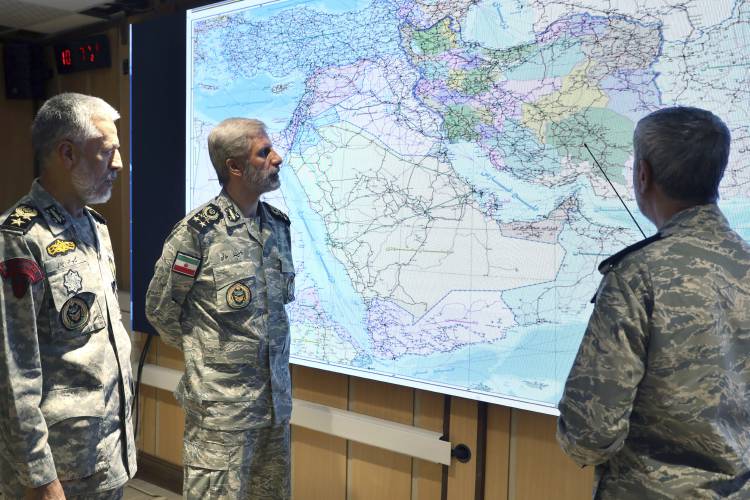Opinion: The art of diplomacy

In this photo released by Iranian army press service, Iran’s army commander-in-chief Gen. Amir Hatami, center, Admiral Mahmoud Mousavi, right, and Admiral Habibollah Sayyari attend a meeting in Zolfaghar central headquarters, Iran. Iranian Army Press Service via AP
| Published: 06-29-2025 12:58 PM |
In my early twenties, I was living in Boston and applied for a sales job at a car dealership. I was planning to earn money for college.
The interview went well until I was asked, “What do you plan to study?” When I said I was planning to study to become a Christian minister, there was a pause and then a cautionary response.
“You know, a successful salesperson does what it takes to close a deal.” The implication was that my ethics might sometimes get in the way of making a sale. I might need to stretch the truth. Closing a deal might mean selling a car to a person who could not afford it. Making a deal is a zero-sum transaction, there is always one winner and one loser. A successful salesperson wins but is able to trick the buyer (the loser) into believing they are getting the better deal in the transaction.
Even though I thought I could close deals using an honest approach that would make us both winners, the interviewer was convinced that I might not be able to equivocate when necessary to make a sale. Needless to say, I did not get the job.
However, this experience has given me some insight into why President Donald Trump’s deal-making is so disruptive. “The art of the deal” has been a strength for Trump in his financial exploits. He has been a skilled dealmaker, winning money and influence. The difficulty arises when Trump attempts to employ the art of the deal for diplomacy.
For example, Trump’s deal-making concerning military aid to President Zelensky focuses not on support for Ukraine’s defense against Russia but upon what’s in it for the United States. Trump asks Zelensky for a mineral sales deal that will profit the U.S. Trump’s country will be the financial winner in the deal to aid Ukraine. It is obvious that there is little patience for the dialogue and relationship-building needed for diplomacy.
Making deals, one on one, with other countries seeks to bypass all of the nuances of diplomacy by demanding fealty to Trump and agreeing with his proposals.
Article continues after...
Yesterday's Most Read Articles
 Surplus seller Ollie’s enters New Hampshire, opens in Belmont
Surplus seller Ollie’s enters New Hampshire, opens in Belmont
 Riverbend to close adult mental health housing facility in Concord due to funding challenges
Riverbend to close adult mental health housing facility in Concord due to funding challenges
 Celebrating National Ice Cream Day with Richardson’s Farm: ‘Nobody else does what we do’
Celebrating National Ice Cream Day with Richardson’s Farm: ‘Nobody else does what we do’
 City officials reject the work of an outside consultant hired to lead Concord’s diversity initiatives
City officials reject the work of an outside consultant hired to lead Concord’s diversity initiatives
 Affordable townhouse expansion gets green light
Affordable townhouse expansion gets green light
Deals like these are immediate and limited to single issues. They weaken relationships and erode trust. The art of the deal builds power and wealth for the U.S. through demands for immediate decisions under the cloud of the unpredictability of Trump’s next move. Therefore, rather than using diplomacy to develop a working relationship with Iran, a specific deal was offered with the expectation of an immediate response: end enrichment of uranium and Iran will gain security from attack.
Iran was slow in responding. So, the U.S. bombed Iranian nuclear facilities.
Deals lead to wars. Iran’s foreign minister, Abbas Araghchi’s, reaction was to accuse the Trump administration of “betraying diplomacy.” He also said that Iran “reserves all options to defend its security interests and people.”
The problem is the president perceives that practicing the art of the deal is diplomacy. However, that is far from the truth.
Diplomacy is about crafting sustainable long-term comprehensive agreements that serve national and international interests. Diplomatic negotiations shape global stability and require finesse, strategic foresight and relationship management. Diplomacy is the established method of influencing the decisions and behavior of foreign governments and peoples through dialogue, negotiation and other measures short of war or violence.
Daniel Warner, author of An Ethic of Responsibility in International Relations, wrote, “Diplomatic negotiations are based on historic relationships with international ramifications. Diplomatic negotiations include unquantifiable national prestige.”
Diplomatic relationships take time to form and they focus on the mutual needs of two or more countries.
It seems, United States diplomacy has become a lost art. Its revival is essential as a practice for negotiating within the international community.
Diplomacy must be used to end the wars raging in Gaza, Iran, Ukraine and other conflicts around the world. Waging diplomacy builds trust where there is no trust, considers mutual aid where there has been little compassion, learns about the value of other cultures when there has been only hegemony, cultivates humility where there has been only arrogance and seeks common goals where there has been only self-righteousness.
Citizens must no longer confuse the method of the great dealmaker with effective diplomacy. Our country is not in sales. It must be in the mode of diplomacy.
Practicing diplomacy is no small deal!
John Buttrick writes from his Vermont Folk Rocker in his Concord home, Minds Crossing. He can be reached at johndbuttrick@gmail.com







 Opinion: Trumpism in a dying democracy
Opinion: Trumpism in a dying democracy Opinion: What Coolidge’s century-old decision can teach us today
Opinion: What Coolidge’s century-old decision can teach us today Opinion: After Roe: Three years of resistance, care and community
Opinion: After Roe: Three years of resistance, care and community Opinion: Iran and Gaza: A U.S. foreign policy of barbarism
Opinion: Iran and Gaza: A U.S. foreign policy of barbarism
